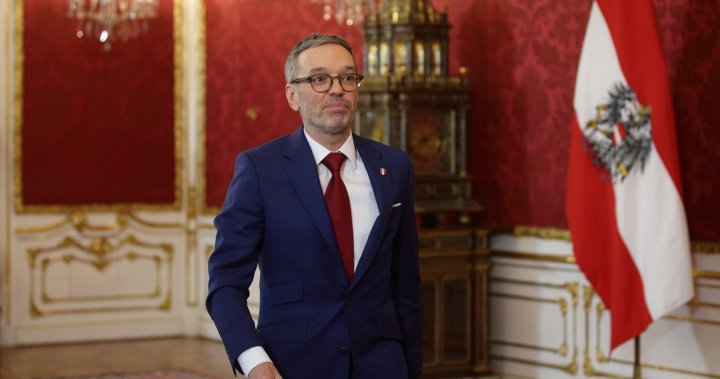The leader of Austria’s Freedom Party received a mandate on Monday to form a new government, which, if successful, would be the first led by the far right since World War II.
The Freedom Party, led by Herbert Kickl, won Austria’s parliamentary elections in September, taking 28.8 percent of the vote and edging outgoing Chancellor Karl Nehammer’s conservative Austrian People’s Party into second place.
But in October, President Alexander Van der Bellen gave Nehammer the first chance to form a new government after Nehammer’s party declared that it would not form a government with the Freedom Party under Kickl and that others refused to work with the Freedom Party at all. Efforts to form a government alliance without the far right collapsed in the first days of the new year and Nehammer announced on Saturday that he would resign.
The People’s Party then indicated that it might be willing to work under Kickl’s leadership. Van der Bellen said after meeting with Kickl for about an hour at the presidential palace on Monday that he had instructed the Freedom Party leader to lead negotiations with the People’s Party to form a new government.

“I did not make this decision lightly,” the president told reporters. “I will continue to ensure that the principles and rules of our constitution are properly observed and upheld.”

Receive national news daily
Get the day’s top news, politics, business and current affairs headlines delivered to your inbox once a day.
The far right and conservatives have governed together before, but several times with the Freedom Party as junior partner. Most recently, they led Austria from 2017 to 2019 in a government in which Kickl – a 56-year-old with a taste for provocation – was interior minister. It collapsed in a scandal surrounding the then leader of the Freedom Party.
Coalition negotiations between the far right and the conservatives are not guaranteed to succeed, but there are no realistic options left in the current parliament and polls suggest that another upcoming election could further strengthen the Freedom Party.
In its election platform titled “Fortress Austria”, the Freedom Party called for “remigration of uninvited foreigners”, to achieve a more “homogeneous” nation by tightly controlling borders and suspending the right to asylum via an emergency law.
The Freedom Party also calls for an end to sanctions against Russia, is very critical of Western military aid to Ukraine and wants to withdraw from the European Sky Shield initiative, a defense project anti-missile launched by Germany. Kickl criticized “elites” in Brussels and called for some powers to be taken back from the European Union to Austria.
Van der Bellen stressed that the new government will not face an easy task.
“The economic context is difficult. Austria is in a persistent recession, unemployment is rising; at the same time, our state budget must be restructured,” he said. “It is unlikely that all measures will be popular, but they will have to be implemented.”
He also highlighted the geopolitical threats that Austria faces, notably due to the Russian war in Ukraine, and stressed the importance of “constructively strengthening European cooperation within the Union, also in the interest of Austrian industry and exporters.
And the head of state, a liberal from the environmentalist Greens, said that he and Kickl had discussed media freedom in Austria at length.
Kickl is confident of finding “viable solutions” in coalition negotiations, “and he wants that accountability,” the president said.
Kickl walked past reporters without comment as he left the meeting.
© 2025 The Canadian Press



